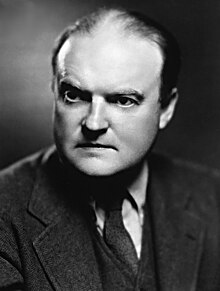Edmund Wilson | |
|---|---|
 Wilson in 1936 | |
| Born | Edmund Wilson Jr. May 8, 1895 Red Bank, New Jersey, U.S. |
| Died | June 12, 1972 (aged 77) Talcottville, New York, U.S. |
| Occupation |
|
| Alma mater | Princeton University |
| Genre |
|
| Notable works |
|
| Notable awards |
|
| Spouse | |
Edmund Wilson Jr. (May 8, 1895 – June 12, 1972) was an American writer, literary critic and journalist. He is widely regarded as one of the most important literary critics of the 20th century. Wilson began his career as a journalist, writing for publications such as Vanity Fair and The New Yorker. He helped to edit The New Republic, served as chief book critic for The New Yorker, and was a frequent contributor to The New York Review of Books.
His notable works include Axel's Castle (1931), described by Joyce Carol Oates as "a groundbreaking study of modern literature." Oates writes that Wilson "encroached fearlessly on areas reserved for academic 'experts': early Christianity in The Dead Sea Scrolls (1955), native American civilization in Apologies to the Iroquois (1960), and the American Civil War in Patriotic Gore (1962)."[1]
Wilson also authored a novel, I Thought of Daisy (1929) and a collection of short stories, Memoirs of Hecate County (1946). He was a friend of many notable figures, including F. Scott Fitzgerald, Ernest Hemingway, John Dos Passos and Vladimir Nabokov. His dream for a Library of America series of national classic works came to fruition through the efforts of Jason Epstein after Wilson's death. He was a two-time winner of the National Book Award and received the Presidential Medal of Freedom in 1964. He died in 1972 at age 77.
- ^ Joyce Carol Oates (ed.). The Best American Essays of the Century. p. 589.